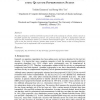62 search results - page 3 / 13 » Classical Knowledge for Quantum Security |
135
click to vote
TCC
2007
Springer
15 years 8 months ago
2007
Springer
Assume that two distant parties, Alice and Bob, as well as an adversary, Eve, have access to (quantum) systems prepared jointly according to a tripartite state ρABE. In addition, ...
103
click to vote
STOC
2002
ACM
16 years 2 months ago
2002
ACM
Secure multi-party computing, also called secure function evaluation, has been extensively studied in classical cryptography. We consider the extension of this task to computation...
118
click to vote
CORR
2010
Springer
15 years 2 months ago
2010
Springer
This letter proposes a novel key distribution protocol with no key exchange in advance, which is secure as the BB84 quantum key distribution protocol. Our protocol utilizes a phot...
111
click to vote
CRYPTO
2009
Springer
15 years 8 months ago
2009
Springer
We consider two-party quantum protocols starting with a transmission of some random BB84 qubits followed by classical messages. We show a general “compiler” improving the secur...
152
click to vote
PPL
2010
15 years 10 days ago
2010
It has been said that quantum cryptography in general o ers a secure solution to the problem of key enhancement. This means that two parties who already share a small secret key, ...

